- Old Draft: Beatles Folk Memory 1970-1995 - December 8, 2025
- Lights are back on. - December 8, 2025
- From Faith Current: “The Sacred Ordinary: St. Peter’s Church Hall” - May 1, 2023
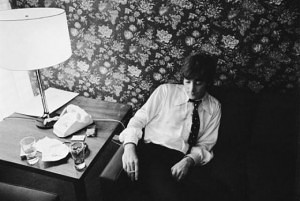
Lennon, in a pensive moment
Attention all armchair Lennonologists: Commenter Karen recently discovered a therapist with an interesting angle on what made John Lennon tick. “Having worked with families with children who demonstrate attachment disorder,” Karen wrote, “I’ve long hypothesized that much of John’s behavior can be explained by the attachment process gone awry.”
Anyone who studies John’s behavior in any depth is struck by its changeability. In the words of this therapist, “One minute soft and tender. In a blink, harsh and cruel – with a legendary acid wit that didn’t seem quite as witty when it was turned on you.” How Lennon’s biographers handle this is fundamental to their view of the man; what demonizer Albert Goldman called “a classic case of multiple personality disorder,” fan Tim Riley dubbed “Lennon’s bipolar muse.” It’s something no biographer can ignore, and no serious fan, either.
John Lennon and Attachment Disorder—Let the psychoanalyzing begin!

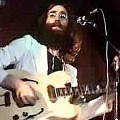
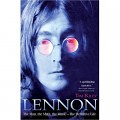
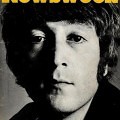
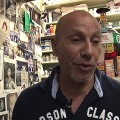
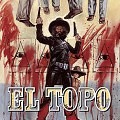
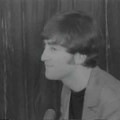
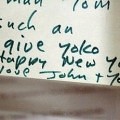
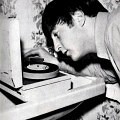


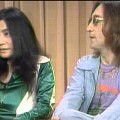

Clearly the author hasn’t read too deeply into John Lennon’s or Yoko Ono’s biographies.
There’s no question that young John experienced attachment difficulties, which, as the therapist describes, shaped his behaviour and coping strategies in later life. John’s history reads like many case studies I’ve seen in my work.
The therapist didn’t diagnose John as having Borderline Personality Disorder per se, he said that John demonstrated BD traits. Two different kettles of fish entirely.
Quite. Also, with John, it may not be all that cut and dried, diagnosis-wise, as this writer appears to believe. For instance, aren’t people with full-blown borderline personality disorder (or whatever one may choose to call it) primarily notable for being utterly unstable in… just about everything, all the time? Yes, John did oscillate wildly between affection and rejection, with regard to himself and others, but he WAS capable of lasting, relatively stable interpersonal relationships, and from what I’ve read (yes, I will admit to never having met the man :-)) he didn’t genuinely lose his sense of self, even when he actively set out to do so (LSD anyone?). Is it possible that a lot of what John did and said had at least as much to do with his immense fame and considerable wealth as with his abandonment/attachment issues?
@Velvet, I think what was going on with John was very complicated–initial makeup PLUS addictions PLUS wealth and fame on a scale unimaginable to normal people. Though I think his behavior was just shockingly bad at times (Julian, for example), he could also be amazingly decent as well. He’s puzzle.
Yes.
Childhood attachment is the absolute foundation upon which we build our adult selves. We know a lot about early years brain development now that we didn’t know even 20 years ago.
As a point of clarification, the author said John had BP traits, not a BP diagnosis.
This isn’t quite on point, but I didn’t feel like digging up the Goldman thread, and this is about John.
I’m finalyl reading the Goldman book, and I think the most fascinating piece of information in there comes at the end. John Lennon says to Jack Douglas that he’s going to be assassinated, and he talks about what will happen to his legend—he’ll become bigger than ever, a martyr. He seems completely dispassionate about this. Lennon at this point in his life is also, apparently, fascinated by bullets and what it’s like to be shot. Goldman’s assertion of what Lennon said to Douglas jives pretty well with Douglas’ comments that John was saying very, very unsettling things on that last night.
I don’t know what to make of that. But it seems like with John and Yoko, especially post-1975 John and Yoko, nothing is out of the question.
Yes, and Victor Spinetti tried to shoot John in “Help!”
John did oscillate wildly, and the Goldman/Douglas anecdote illustrates that as well. Because in the Wenner interviews, he paints a picture of himself as an old man many years in the future, perhaps writing and illustrating children’s books, and in the Lennon box set, we hear this exchange with Phil Spector:
Lennon: “What are they gonna do, play jazz with Jethro Tull?”
Spector: “No, Elton John, probably.”
Lennon: “Elton is good friend of mine.”
Spector: “Well, it’s good. He’s got the same name as you, only you spell it in front and he spells it in the back. And you both go to the same place.”
Lennon: “No, no, no, no, I refuse. Elton’s gonna die young. I’m gonna be a ninety-year old guru.”
Spector: “Okay I make history, you make guru’s.”
Lennon: “Phil; I’m gonna write your history, so be careful.”
But then, in 1980, Lennon tells Douglas his days are numbered, and that he’ll be a martyr.
Lennon oscillated between hope for his future… and despair.
And doesn’t Goldman go into some detail about written death threats Lennon received? That would be enough to shake anyone from the notion of being a nonagenarian guru/illustrator.
A psychologist friend of mine has diagnosed John with bipolar II with borderline traits. And obviously there were substance abuse issues there, too.
[WORDPRESS HASHCASH] The poster sent us ‘0 which is not a hashcash value.
I would even speculate that he might have BP 1, if he was a rapid cycler.
I also meant to add that I would bet money that John was bipolar. Many people with bipolar disorder experience early life attachment issues as well.
Possible title for next John Lennon biography: “I’ve Got Something To Say That Might Cause You Pain – The John Lennon Story”
http://www.youtube.com/watch?v=W2lmphAXVTk
I had suspected as much, as I had written in http://radkid.org/mother.html
@Ken, do you have an opinion as to what kind(s) of therapy might have helped Lennon as an adult?
When John and Yoko visited me on 79th Street he was wonderfully normal as could be: talked about the photographer Lartigue, other artists, had fun looking through an old book of “Negro” songs, played on my son’s awful guitar and repeated the lyrics of one of the songs from the book (I have it on tape). Goes like this:
OH MY NAME IS SAM
AND I DON’T GIVE A DAMN
I’D RATHER BE A NIGGER’N
A POOR WHITE MAN
He kept doing this song over and over again..When he left I loaned him the book, and at the elevator he said to me, kind of sadly, “why do people always give you things when you don’t need ’em” Not meaning of course the wonderful book, but he was recalling in that moment the times he had wanted or needed something but what he needed was not forthcoming. There was the child in John still needing, still suffering. And the small gift of the book of lyrics meant so much. I suppose he copied the lyrics he wanted from the book, and his chauffeur returned it a few days later. I have the book somewhere. Have been meaning to check out the lyrics myself. An old treasure trove. Authentic. Glad i have it….I remember at the Iverson, Yoko’s show there, and afterwards at the hotel a few of us were there celebrating John’s birthday, Ringo on an upside down metal waste basket, drumming along, everyone else on guitar, except for Alan Ginsburg, Phil Spector doing I know not what. And John said the only words to a song that he remembered was SUMMERTIME, so everybody sang or played the guitars to SUMMERTIME. It was really nice. And then the hotel baker brought in a large cake in the shape of a guitar. Pretty appropriate. I have these little memories of John and Yoko, and some big ones too.
ROSALYN DREXLER
Welcome, Rosalyn! Do you remember what year that was? 1970 or ’71, maybe? Was that the Hotel Pierre?
Everybody, go Google “Rosalyn Drexler.” You’ll be knocked out by her work.
Wow! I wish I’d have found this thread a year ago as I began working on my final paper for the class I had been taking at The College of NJ. I quickly became fascinated with researching John’s life, especially his behavioral patterns, and AS AN ARMCHAIR PSYCHOLOGIST (I want to be sure everyone knows that this is NOT my field of expertise) wrote a paper, “Exposing the Voice of Truth: A Psychological Profile of John Lennon.”
I recognized patterns of Borderline Personality Disorder in John’s erratic mood shifts from the many accounts dictated by John’s inner circle of friends and family. It seemed to me that the self-medicating (booze & drugs) exacerbated the disorder. I have family members who struggle with BPD, so the similarities kept smakcking me hard as I researched John’s life.
It takes a strong-willed woman to endure that kind of instability, plus a heavy dose of love and commitment; and, though I think that Cynthia was a lovely, caring woman who was entirely devoted to John, she just wasn’t emotionally equipped to deal with her husband’s instability. The abuse that BPD family members must endure can certainly take a toll on one’s self-esteem. It breaks my heart to read stories about how demeaning John could be to those he loved.
I also think John knew that Yoko understood him better than any woman ever had, and this is why he clung to her. Look at how he fell apart during his infamous “Lost Weekend!” Yet, when he and Yoko got back together, John cleaned up his act (as much as he was willing to, that is) and tried to do good by his second wife and second son.
It drives me nuts when people bash on Yoko. I think they were perfect for each other and that she recognized “the little child inside the man” and tried her best to give him the nurturing he never got from Julia or Mimi.
Glad you found the thread, Deb — your paper sounds very interesting. And welcome to one of the fellowships of amateur psychologists!
Thanks, Nancy, but from what I’ve been reading here, my amateur psycho-analysis of John is nothing new. At least my observations and intuition were on track with those of the professionals in this field.
Except, @Deb, John DIDN’T fall apart during the “Lost Weekend.” It was certainly his most successful solo period, and his most active post-Beatles one, too. Unlike before or after, he seemed to have friends and peers, a robust social network; he wasn’t isolated, nor monomanic. Emotionally — well, only he knew, but if the Smothers Brothers incident is the nadir of a rock star’s public behavior, that’s pretty tame.
I’d argue that during the so-called “Lost Weekend” John showed more ability to function as an autonomous adult, more ability to conceive work and bring it to completion, a stronger and healthier social life, a willingness and ability to connect authentically with his first son, better relations with Paul and the other Beatles, less poor judgment in business, and in general less anger and paranoia. The only reason we consider this period a Lost Weekend is how John constantly calls it that (with no evidence of crisis — no time at The Priory or some such place; no run-ins with the law; no disastrous business decisions; no impulsive marriage or paternity suits). He endlessly devalues that period, just as he endlessly devalues the period 1964-67…after he’s back with Yoko. This seems to be the price of the marriage, but just because that was apparently their agreement, that doesn’t mean we can or should take it as truth.
The whole Ballad of John and Yoko relies on the Lost Weekend — stern-but-loving Mother taking him back, and redeeming the bad little boy John — but it simply doesn’t hold up when you look at what he did, not what he said. John endlessly talked about how miserable he was before Yoko, and then during the Lost Weekend, but the time when he showed the clearest signs of depression was 1975-80, not 1965-67 or 1973-75.
And as far as “love and commitment,” there’s significant evidence to suggest that their marriage was very, very rocky — which is not to judge either of them, nor to suggest that they weren’t right for each other. But I will say that “John and Yoko” doesn’t feel like any stable, loving marriage I’ve ever known, and once you go there — comparing this couple’s emotional lives (which we know quite a lot about, at least from John’s side) to actual couples you know — the whole Ballad falls apart.
But more interesting than the truth or falsity of the Ballad is the why of it. Why did they feel the need to mythologize their marriage? What price did they pay for doing this? And why do so many fans seem to NEED to believe it? (Not saying you do, @Deb; more remarking on the people I met at Beatlefest.)
Have to disagree with you about Yoko. Your loved ones should make your world larger, not smaller. They should help you integrate your past with your present and future, not give you a sword to hang over you bed to “cut yourself from your past.” John’s despair away from her was like a drug addict without a hit–hardly healthy.
There isn’t enough space here to discuss the neurotic elements of that relationship.
John had congenital familial Asperger’s syndrome and attachment disorder resulting from parental mistakes and
bad aptitude for attachment due to autism spectrum disorder and myopia. Later on he developed narcissistic symptoms, which he seems to have recognized early in himself and tried to nip in the bud. Yoko had probably a genetic predisposition to autism spectrum disorders too, as well as severe PTSD, which together form the perfect recipe for borderline personality disorder.
However loving her relationship with John was, it was ultimately an abusive relationship with John as the abused partner.
John had congenital familial Asperger’s syndrome and attachment disorder resulting from parental mistakes and bad aptitude for attachment due to autism spectrum disorder and myopia.
.
Well, obviously.